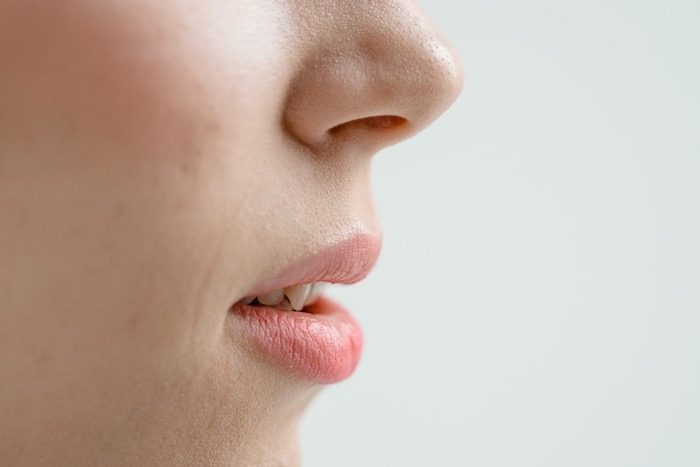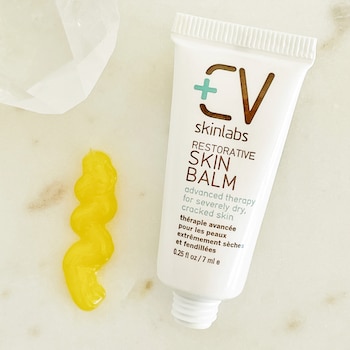
Winter weather often causes cracked lip corners.
They’re not only sore but unattractive.
To soothe the pain and recover your kissable lips, try the tips below!
What Are Cracked Lip Corners?
Cracked lips corners can develop because of a few different factors:
 Chapped Lips Can Cause Cracked Lip Corners
Chapped Lips Can Cause Cracked Lip Corners
Cold, dry air in the winter saps the lips of moisture, creating dryness, flaking, and cracking. If you lick your lips you can make it worse, as when your saliva evaporates, leaving your lips even dryer.
The skin on your lips is thinner and more sensitive than the skin on the rest of your body. It doesn’t contain oil glands either, which means your lips have no natural way to replenish their moisture.
No wonder they can get dry and chapped so easily.
The lips are also exposed to the cold air and ultraviolet rays from the sun more than most of the rest of your skin, which increases the risk of developing damaged, dry skin.
Without treatment, the dryness on your lips can spread to the corners of your mouth, and the lack of moisture can lead to cracking and even bleeding.
Allergies Can Cause Cracked Lip Corners
If you have allergies, particularly if you’re allergic to any foods you eat or beverages you drink, you could make your cracked lip corners worse.
Your skin may react to certain allergens in food, becoming inflamed and increasing dryness, cracking, and flaking.
Angular Cheilitis Can Cause Cracked Lip Corners
This is a fungal infection that can develop in the corners of your mouth. It’s caused by a fungus called Candida Albicans that often lives in the mouth and other moist areas of the body.
Usually, it doesn’t cause any harm, but sometimes it can grow out of control and lead to an infection that shows up on your mouth corners. Things that may increase your risk of this type of infection include:
- Dry mouth
- Dehydration
- Certain medications (like the acne drug isotretinoin or chemotherapy drugs)
- Autoimmune conditions like Crohn’s disease and lupus
- Harsh, dry winter weather
- Oral appliances like retainers
Saliva Can Cause Cracked Lip Corners
As mentioned above, when you lick your lips, the saliva evaporates and causes the skin to dry out. In addition, your saliva contains microorganisms, so if your skin is already dry, you could be more at risk of an infection at the corners of your mouth.
7 Ways to Clear Up Cracked Lip Corners
Once your lips are cracked, dry, red, and inflamed, regular chapstick isn’t going to do much to help. It can help moisten your lips, but most brands do not contain the ingredients needed to heal inflamed, cracked skin at the corners.
1. Ask your dermatologist.
The first thing you want to do is make sure that you don’t have angular cheilitis. If you do have it, you may need a medicated cream to help clear up the infection before the dryness and inflammation will go away.
Common symptoms of angular cheilitis include:
- Redness and swelling in the corners of the mouth
- Cracking or crusting
- Pain or soreness
- Burning
- A whitening or thickening of the skin around the corners of the mouth
An at-home tip for avoiding infections in the corner of your mouth is to eat more yogurt and other probiotic foods. They can help fight the infection and keep your immune system strong.
 2. Use our Restorative Skin Balm.
2. Use our Restorative Skin Balm.
If your cracked lip corners are caused by dryness and irritation, you need a balm to help heal the wounded skin. Our Restorative Skin Balm is perfect for the job.
It contains carnauba and bee’s wax to safeguard skin while healing is taking place. Then vitamin E and sea buckthorn oil, aid in wound healing, while providing antioxidant protection.
Natural oils like safflower and jojoba penetrate the skin to deeply moisturize, while shea butter provides plumping fatty acids. Other ingredients like arnica calm inflammation so that your skin feels more comfortable.
Plus it’s a 100% natural, clinically proven, and a steroid- and petrolatum-free option to help heal the skin.
Apply as many times throughout the day as you like (keep it with you!), but be sure to apply before going to bed at night.
3. Drink more water.
Have you ever noticed that when you’re even mildly dehydrated the first place it shows up is on your lips? Water is the best way to replace lost moisture and it really works. Shoot for at least eight glasses a day. Realize that your thirst indicator isn’t usually as accurate in the cold weather, and you may not feel thirsty even when you need more water.
4. Invest in a humidifier.
These put water back into the air, which can give your lips a break. Instead of having to fight all the time to hold onto the little water they have, they can relax and stay hydrated when the air isn’t trying to rob them all the time.
The best place for a humidifier if you can purchase only one is in your bedroom. It will help hydrate your lips overnight.
5. Check your vitamin B and zinc levels.
In some cases, cracked, peeling lips can be a sign of a vitamin B deficiency. This is more common in people over the age of 50 when the body has more difficulty absorbing some types of B vitamins.
Check with your doctor and consider adding some vitamin B supplements to your daily regimen.
A zinc deficiency may also lead to cracking in the corner of your mouth, but this is less common. It may help to get more daily zinc into your diet (shellfish, beef, chicken) or you may want to take zinc supplements now and then to restore your levels. Always check with your doctor first.
6. Stop licking your lips.
As mentioned above, when you lick your lips, you not only make them dryer, but you also risk carrying bacteria into the corners of your mouth that could result in an infection.
Whenever you notice yourself licking your lips, apply lip balm (or our Restorative Skin Balm). Gradually, you’ll gain the habit of applying balm to your lips when they feel dry instead of licking them.
7. Check for any underlying conditions.
Sometimes people with diabetes or a weakened immune system are more likely to suffer from a dry, cracked mouth. If you get these cracks in the corners of your mouth fairly frequently, or if the treatments listed here don’t help, ask your doctor about any other conditions you may have that could be contributing to it.
Do you struggle with cracked lip corners in the winter?

